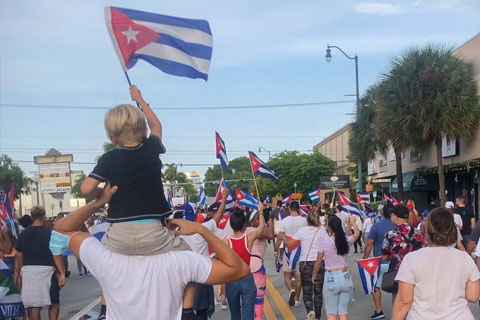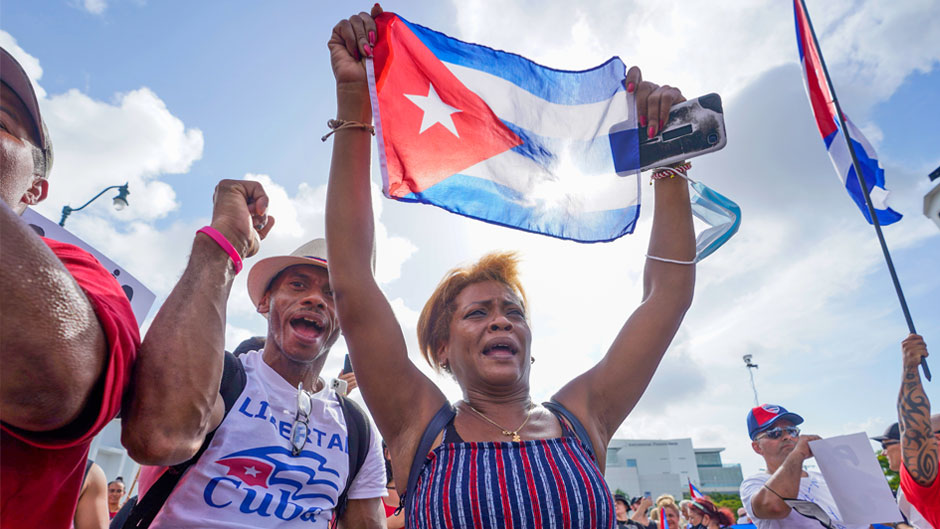Since last week’s historic protests ignited, Cuban American students are closely watching and using their voices to call for an end to Cuba’s 62-year communist regime.
Some students at the University still have relatives on the Caribbean island and are concerned about the oppressive regime. One of those students is senior Alejandra Curbelo-Paz. She was born in Cuba and came to Miami with her mom when she was 6 years old.
“When this country was celebrating its independence, I was also celebrating my own independence,” said Curbelo-Paz, a health sciences major about her arrival to the United States on the Fourth of July. “My relatives are still there, and I obviously get to find out firsthand everything that’s going on.”
Like many others in Miami, Curbelo-Paz is using her voice in the U.S. to speak out against Cuba’s current authoritarian dictatorship, which doesn’t allow freedom of speech or voting rights. Many locals on the island have reported to their families that they are facing severe food and medicine shortages; ridiculously high inflation rates; power outages; and are unable to obtain basic everyday goods and supplies like toilet paper and soap.
“This is a humanitarian crisis,” said Curbelo-Paz, who thanks the artists and activists in Cuba who sparked the recent uprisal. “As of now, people are dying, and people are suffering. Human rights should never be about politics, it should just be about what people deserve.”
A relative of Curbela-Paz, who lives in Cuba, shared the current conditions of the hospitals on the island.
“There are no medications for people with hypertension, diabetes. There are no basic antibiotics right now,” Curbelo-Paz pointed out. “There’s nothing to help the patients. If right now you go to a Cuban hospital surgery room, you will see that the roof has huge water leaks—in a room that is supposed to be sterile.”
Since the protests, patients who go to the hospital with wounds that appear to be gunshot related or from street protests are turned away, Curbelo-Paz was told.
 |
| Vanessa Bonilla, president of the Colombian student association, took this photo during a recent rally in Miami in support of protests in Cuba. |
Around the world, people have been demonstrating in the streets to demand that people in Cuba are granted greater freedoms.
Alfred Labrada, a senior studying computer science, participated in a recent protest at Café Versailles, one of Miami’s most celebrated Cuban restaurants near Little Havana.
“Cuba holds a special place in my heart, and right now it’s just frustrating to see what’s happening,” said Labrada. “I wish I had an opportunity to show people who have these views that this is not happening because of the U.S. embargo and show them what’s happening for real through the lens of my sister who is in Cuba.”
Labrada said that while many are pointing to the U.S. embargo for what is happening in Cuba, they need to look at the country’s leadership. He is speaking out against those who support Cuba’s president, Miguel Diaz-Canel, and his response to curbing the effects of the pandemic and the protests—which included turning off access to the internet and jailing protesters. Like many others protesting in the streets of Miami and demanding change, Labrada wants to see the current regime disassembled. “There is a huge need for intervention right now,” he said.
Sydney Stropes is a Cuban American student double majoring in religion and health care and nursing. She serves as the president of Federaciόn de Estudiantes Cubanos (FEC), a student organization founded to share Cuban culture, values, and tradition and to form friendships. She wants her peers to know that she advocates for every Cuban student at the University of Miami—no matter their political stance.
“We hear our students, and we see them trying to share stories that matter to them,” said Stropes, who took to the organization’s social media channels last week to urge members of the campus community to do their own research and to be careful about misinformation being spread online and in the media. “This week, I spent a lot of my time talking to a lot of my non-Cuban peers—and even Cuban peers— about the history of Cuba,” she added.
Admittingly, Stropes said facts about Cuba are “inherently political at times, but FEC is trying to get the true story, and the right sources out there using platforms like Instagram.”
Angel Aguilar, a sophomore studying economics and political science and a member of FEC, said he and his peers want to see a resolution to the violence and a change in government. He’s proud of the people in Miami, Tampa, and other cities putting pressure on the current Cuban administration.
“I will say, it’s a tricky situation,” said Aguilar. “We have to reach out to more allies on this issue, because it’s heartbreaking to see this continuing after more than 60 years.”
Curbelo-Paz, like many Cuban Americans, has high hopes for the future of Cuba.
“The hope that has been in my heart since I was 6 years old has been that one day a bridge would magically appear and close the 90-mile gap between my relatives and me,” lamented Curbelo-Paz. “That one day I will be able to share a birthday or Christmas—with them in complete freedom.”

